Hello Happiness - IELTS Reading Answers
11 min read
Updated On
-
Copy link
Prepare for the IELTS exam with Hello Happiness IELTS Reading Answers to improve your reading score. Find out how to handle different types of IELTS Reading questions, along with answers and explanations & be prepared to achieve your desired Band 9 score.
Table of Contents

Limited-Time Offer : Access a FREE 10-Day IELTS Study Plan!
Finding the right answer in IELTS Reading often starts with finding the right keywords. But not all keywords are created equal; while some are too common, others are paraphrased, and a few are hidden in tricky formats. With targeted practice of reading samples from the best IELTS Reading books, like ‘Hello Happiness IELTS Reading Answers’ and keyword-mapping exercises, you will become quicker at navigating the passage and locking in correct answers.
Therefore, to improve your performance in the reading module, check your answers against the provided Hello Happiness Reading Answers, explanations, and tips in this blog.
Passage for Hello Happiness Reading Answers
The ‘Hello Happiness’ Reading Answers passage provided below offers valuable practice for the IELTS reading exam. Practicing this passage and focusing on similar IELTS Reading topics for General and Academic will greatly improve your skills in tackling various reading passages.
You should spend about 20 minutes on Questions 1-13, which are based on the reading passage below.
Hello Happiness
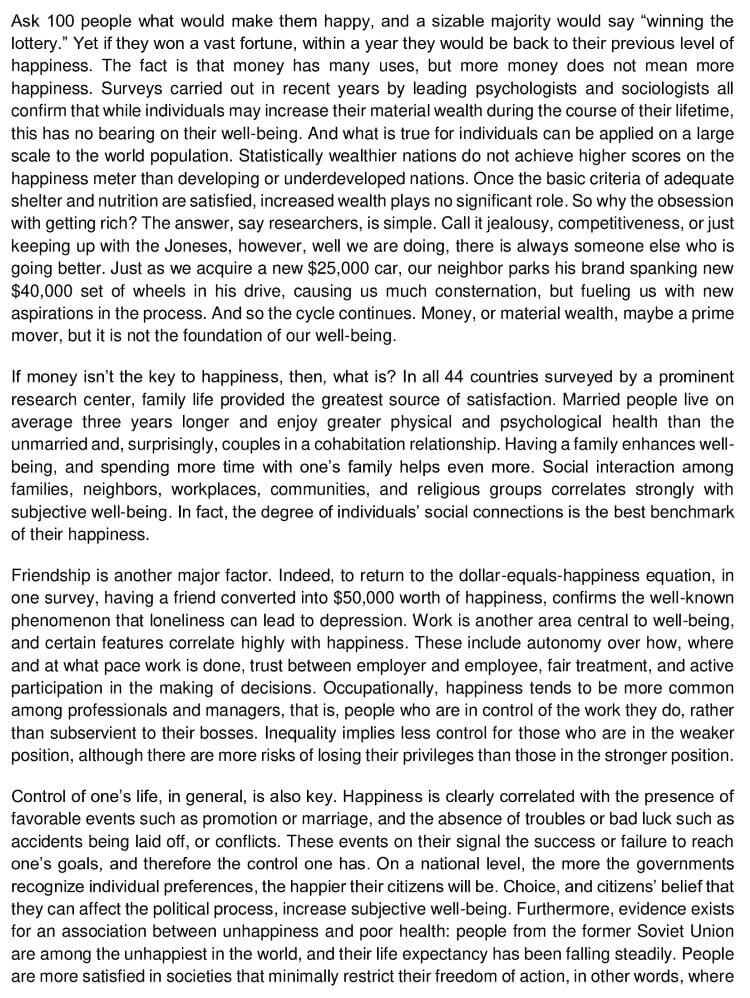
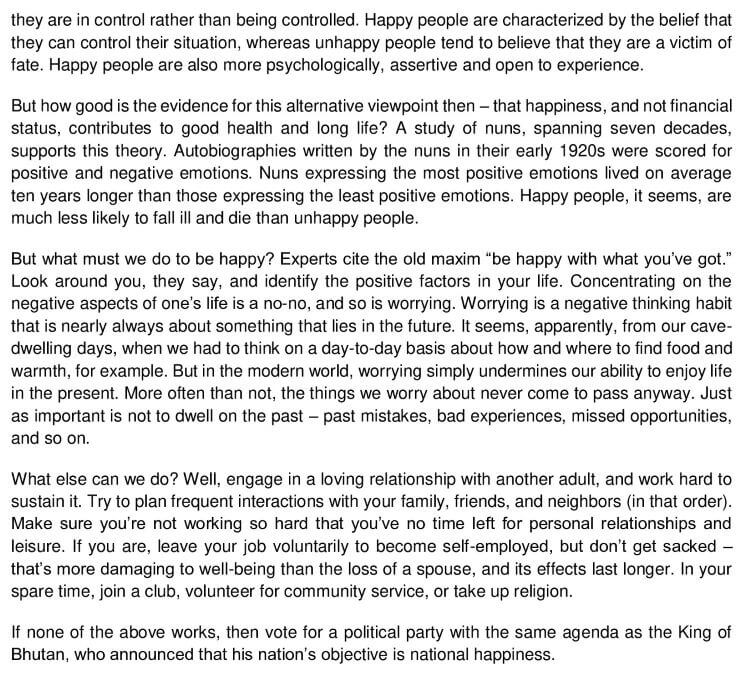
Questions for Hello Happiness Reading Answers
The ‘Hello Happiness’ is an IELTS Academic passage with 13 questions. It will help you understand what kind of reading passages you will encounter and the questions that you will be asked to solve.
The question types in this reading passage include:
- IELTS Reading Matching Information (Q. 1-5)
- IELTS Reading Summary Completion (Q. 6-9)
- IELTS Reading True/False/Not Given (Q. 10-13)
Questions 1-3
Choose THREE letters A-H.
Circle the correct letters, A-H, below
NB, Your answers may be given in any order.
Which THREE of the following statements are true, according to the text?
A Money can bring misery.
B Wealthier nations place more emphasis on happiness than poorer ones.
C Securing a place to live is a basic human need.
D The desire for social status is a global phenomenon.
E An unmarried couple living together is less likely to be happy than a married couple.
F The less responsibility one has, the happier one is.
G Involvement in policy-making can increase well-being.
H Our prehistoric ancestors were happier than we are.
Questions 4-7
Complete the summary using the list of words, A-I, below.
Write the correct letter, A-I, in boxes 4-7 on your answer sheet.
Money can buy you just about anything, but not, it seems happiness. Whether on a personal or national 4……………………………, your bank balance won’t make you happier. Once the basic criteria of a roof over your head and food on the table have been met, money ceases to play a part. One of the most important factors in achieving happiness is the extent of our social 5…………………………… – our relationships with family, friends, colleagues, and so on. Equally important is the amount of 6…………………………….. we have, either in our personal life, working life, or even in our ability to influence the political 7…………………………. that our country embarks on.
A episode
B interaction
C cooperation
D control
E number
F level
G course
H conflict
I limit
Questions 8-13
Do the following statements agree with the information given in the Reading Passage?
In boxes 8-13 on your answer sheet, write
TRUE – if the statement agrees with the information
FALSE – if the statement contradicts the information
NOT GIVEN – if there is no information on this
8 People from underdeveloped nations try to attain the same standard of living as those from developed nations. …………………………………..
9 Seeing what others have makes people want to have it too. ………………….
10 The larger the family is, the happier the parents will probably be. …………………..
11 One’s attitude to life has no influence on one’s health. ………………………….
12 Instinct can be a barrier to happiness. ……………………
13 Family and friends rank equally as sources of happiness. ………………..
Learn quick methods to conquer passages like ‘Hello Happiness’ within 20 minutes.
Join our FREE IELTS webinars!
Answers for Hello Happiness with Location and Explanations
Now it is time to cross-check your answers using the answer key below for the Hello Happiness IELTS Reading passage. Don’t forget to create strategies based on the feedback from this practice and master IELTS Reading question types with examples.
1 Answer: C
Question type: Matching information
Answer location: Paragraph 1, lines 10-12
Answer explanation: “Once the basic criteria of adequate shelter and nutrition are satisfied, increased wealth plays no significant role.” This suggests that having a shelter to live in is a fundamental necessity and this point is made in the passage as can be seen from the lines.
2 Answer: E
Question type: Matching information
Answer location: Paragraph 2, lines 3-5
Answer explanation: “Married people live on average three years longer and enjoy greater physical and psychological health than the unmarried and, surprisingly, couples in a cohabitation relationship.” This suggests that the unmarried couple/cohabiting couple is less probable to be happy and that the married couples are happier than them. This point is thus made in the passage.
3 Answer: G
Question type: Matching information
Answer location: Paragraph 3, lines 4-7
Answer explanation: “Work is another area central to well-being, and certain features correlate highly with happiness. These include autonomy over how, where, and at what pace work is done, trust between employer and employee, fair treatment, and active participation in the making of decisions.” This suggests that the fervency and enthusiasm one has in decision/policy making is proportional to one’s happiness. This point, therefore, is made in the passage.
4 Answer: F
Question type: Summary completion
Answer location: Paragraph 1, lines 4-8
Answer explanation: “Surveys carried out in recent years by leading psychologists and sociologists all confirm that while individuals may increase their material wealth during the course of their lifetime, this has no bearing on their well-being. And what is true for individuals can be applied on a large scale to the world population.” This clearly implies that on an individual level or on a national scale/level, money can’t buy happiness.
5 Answer: B
Question type: Summary completion
Answer location: Paragraph 2, lines 6-9
Answer explanation: “Social interaction among families, neighbors, workplaces, communities, and religious groups correlates strongly with subjective well-being. In fact, the degree of individuals’ social connections is the best benchmark of their happiness.” This clearly states that the more one socially interacts with people, the happier one is. Therefore, social interaction is one of the determinants of happiness.
6 Answer: D
Question type: Summary completion
Answer location: Paragraph 4, lines 1-5
Answer explanation: “Control of one’s life, in general, is also key. Happiness is clearly correlated with the presence of favorable events such as promotion or marriage, and the absence of troubles or bad luck such as accidents being laid off, or conflicts. These events on their signal the success or failure to reach one’s goals, and therefore the control one has.” This highlights the essence of control and its effects on one’s happiness in life. Hence, having control is an important factor for happiness.
7 Answer: G
Question type: Summary completion
Answer location:
Answer explanation: “On a national level, the more the governments recognize individual preferences, the happier their citizens will be. Choice, and citizens’ belief that they can affect the political process, increase subjective well-being.” This suggests that having control of the matters on a national level or the political course is, as well, a determining factor of how happy and free one feels live.
8 Answer: NOT GIVEN
Question type: True/False/Not given
Answer location: N/A
Answer explanation: There is no such reference made where the people from underdeveloped nations show any kind of intent or ambition to lead a life of the people from developed nations.
9 Answer: TRUE
Question type: True/False/Not given
Answer location: Paragraph 1, lines 13-17
Answer explanation: “Call it jealousy, competitiveness, or just keeping up with the Joneses, however, well we are doing, there is always someone else who is going better. Just as we acquire a new $25,000 car, our neighbor parks his brand spanking new $40,000 set of wheels in his drive, causing us much consternation, but fueling us with new aspirations in the process.” This suggests that out of competitive spirit and jealousy, people want to have what others have, and hence, the statement is true.
10 Answer: NOT GIVEN
Question type: True/False/Not given
Answer location: N/A
Answer explanation: There is no reference where the relation between the size of a family and the level of happiness is established in the passage.
11 Answer: FALSE
Question type: True/False/Not given
Answer location: Paragraph 5, lines 4-6
Answer explanation: “Nuns expressing the most positive emotions lived on average ten years longer than those expressing the least positive emotions. Happy people, it seems, are much less likely to fall ill and die than unhappy people.” This clearly suggests that the happier one is, the more one lives. Therefore, happiness affects one’s health and so, the given statement is false.
12 Answer: TRUE
Question type: True/False/Not given
Answer location: Paragraph 6, lines 2-4
Answer explanation: “Concentrating on the negative aspects of one’s life is a no-no, and so is worrying. Worrying is a negative thinking habit that is nearly always about something that lies in the future.” This suggests that one shouldn’t concentrate on the negative aspects of life or one shouldn’t keep on thinking about the future. This implies that one shouldn’t be instinctive and it is not needed in life nowadays. Hence, instincts pose uncertainty and that causes one to worry, which in turn, makes one unhappy. Hence, the statement is true.
13 Answer: FALSE
Question type: True/False/Not given
Answer location: Paragraph 7, lines 2-3
Answer explanation: “Try to plan frequent interactions with your family, friends, and neighbors (in that order).” This clearly states the order of priority/ranks. Hence, all three of them do not belong to the same rank and so, the statement made is not true.
Master Academic Reading with our IELTS Reading guide for high scores on passages like ‘Hello Happiness Reading Answers’!
Tips to Solve the Passage Question Types in the Hello Happiness Reading Answers
Preparation might seem to be incomplete without some tips to improve. So, let us check out some quick IELTS exam preparation tips for band score of 8+ to answer the passage question types in the Reading Answers of Hello Happiness.
Matching Information
- Read all 8 options carefully first: Don’t skim through the options. You need to understand the main idea in each option. For that, you should highlight key ideas, for example, money = misery, social status = global, policy involvement = happiness.
- Scan the passage for matching ideas: Don’t look for exact words. Look for paraphrases. For instance, with the statement, ‘Money can bring misery’, look for any mention of wealth leading to unhappiness. Similarly, for ‘Prehistoric ancestors were happier’, check if the passage directly compares past and present happiness.
- Underline extreme language: Words like ‘less likely’, ‘the happier one is’, or ‘more emphasis’ require careful checking. Such strong claims often lead to FALSE or trick answers.
- Select ONLY the three fully supported statements: An option is true only if the entire statement is supported. If part of it is unproven, it does not qualify.
- Use the process of elimination: As you scan and verify which statements are true, eliminate the rest. Mark or write down short evidence lines for each match.
Summary Completion (with Word Bank)
- Read the summary passage completely: Understand the overall theme (here, it is money and happiness). This helps predict what kind of words (noun, verb, adjective) are missing.
- Predict the Type of Word Needed: You need to understand whether the missing word is a noun, abstract noun, or a concept like ‘power’, ‘influence’, ‘support’. For example, in the sentence, ‘Extent of our social ____’, expect a noun related to relationships or connectivity.
- Go through each option (A–I) before inserting: Understand each word’s meaning and check whether it fits both grammatically and logically.
- Locate keywords in the passage: As mentioned in the introduction to this blog, locating keywords is a key factor to finding the correct answer. For example, ‘Social interactions’ may be written as ‘relationships with family and friends’, ‘Control’ might be paraphrased as ‘power to make decisions’, and ‘Course’ might appear as ‘direction a government takes’.
- Use Only the Correct Letter (A–I), Not the Word: Double-check you're writing the letter on your answer sheet, not the word.
True/False/Not Given
- Read the statement and break it down: Focus on what claim is being made, and which part of it can be checked or verified in the passage.
- Underline key phrases: While going through the statement, underline or mark the keywords. For example, ‘Larger family → happier parents” and check if that direct connection is made.
- Scan for keywords or synonyms in the passage: Look for related ideas. For Q9 (‘seeing what others have’), search for ‘comparison’, ‘envy’, ‘status’.
- Apply this logic to every statement:
- TRUE: Clearly stated in the text (exact or paraphrased).
- FALSE: The passage directly contradicts the statement.
- NOT GIVEN: The idea or detail is missing or not discussed (even if you think it’s true in real life).
- Avoid Using Outside Knowledge: Stick strictly to what is mentioned in the passage. If there is no reference to health or family size, the answer must be NOT GIVEN.
Well done on completing the Hello Happiness reading passage! Improving your reading speed, question familiarity, and information retrieval skills are all vital for a high IELTS score. So, to crack IELTS Reading in the first go, try solving more of the recent IELTS Reading practice tests and work on your comprehension skills.
Useful Links:
- Space Travel And Health- IELTS Reading Answers
- Food For Thoughts- IELTS Reading Answers
- Memory and Age- IELTS Reading Answers
- The Beginning of Football- IELTS Reading Answers
- Brain Activating- IELTS Reading Answers
- Bumblebee Conservation- IELTS Reading Answers
- How to Complete IELTS Reading in Less than an Hour?
- Useful IELTS Reading Articles, Website Resources and Material for Academic and General Training
Practice IELTS Reading based on question types

Start Preparing for IELTS: Get Your 10-Day Study Plan Today!
Explore other Reading Actual Tests
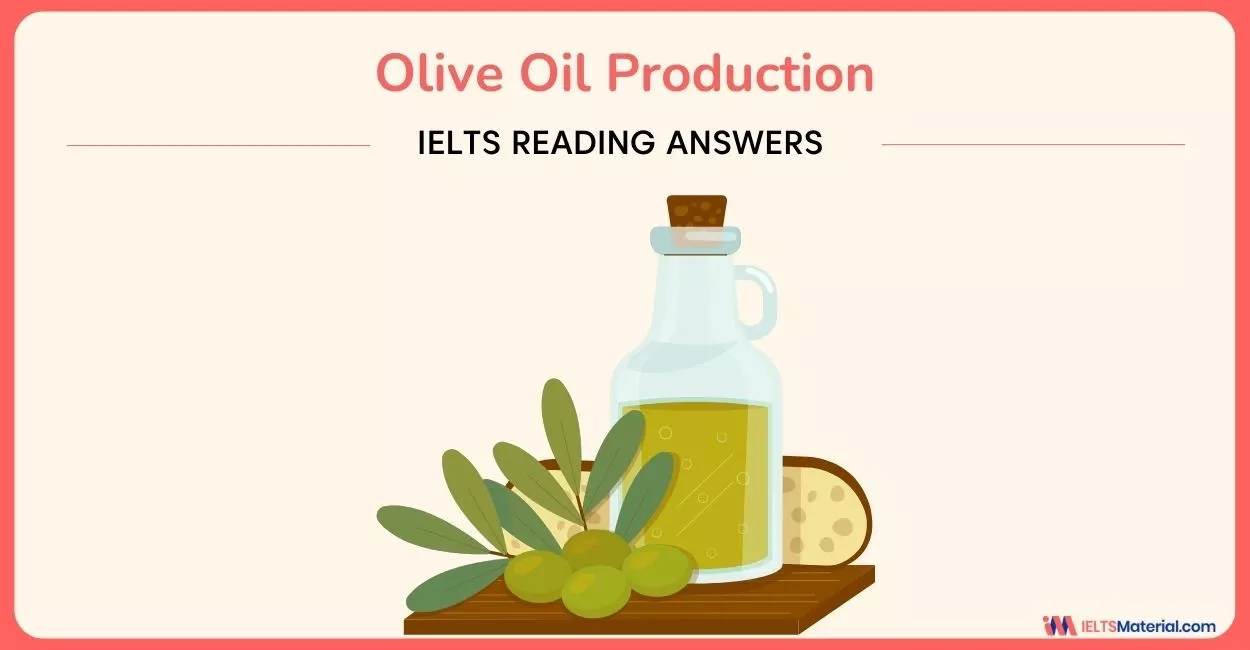
Kasturika Samanta
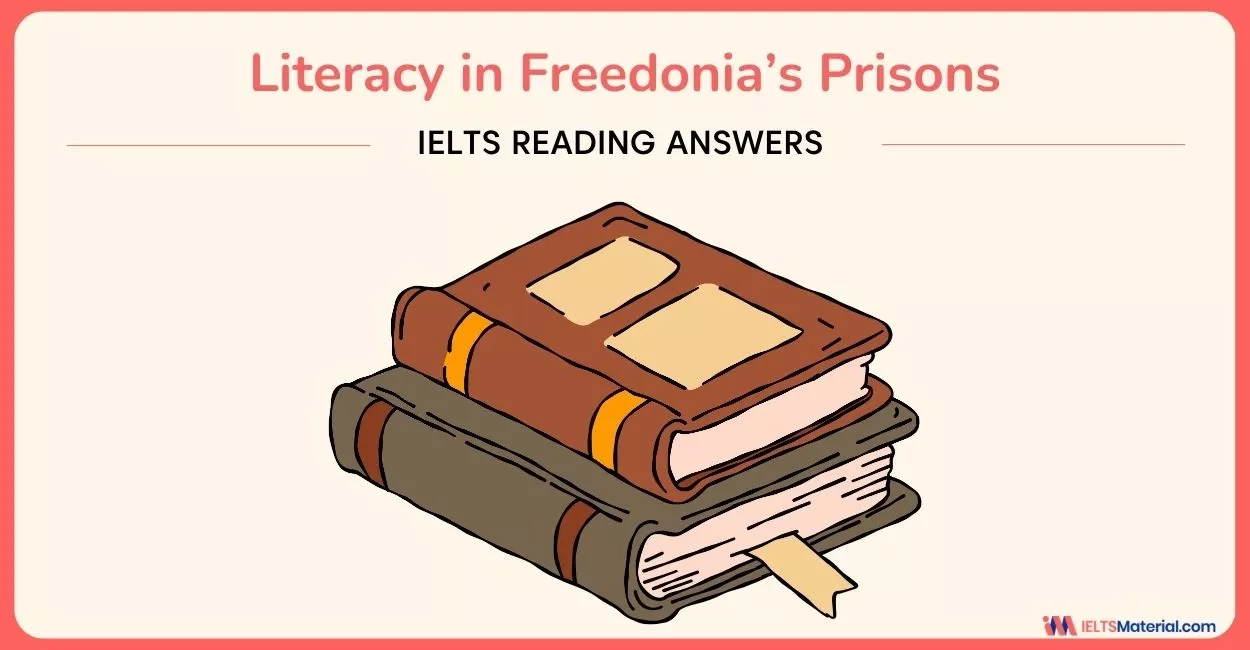
Prity Mallick

Kasturika Samanta
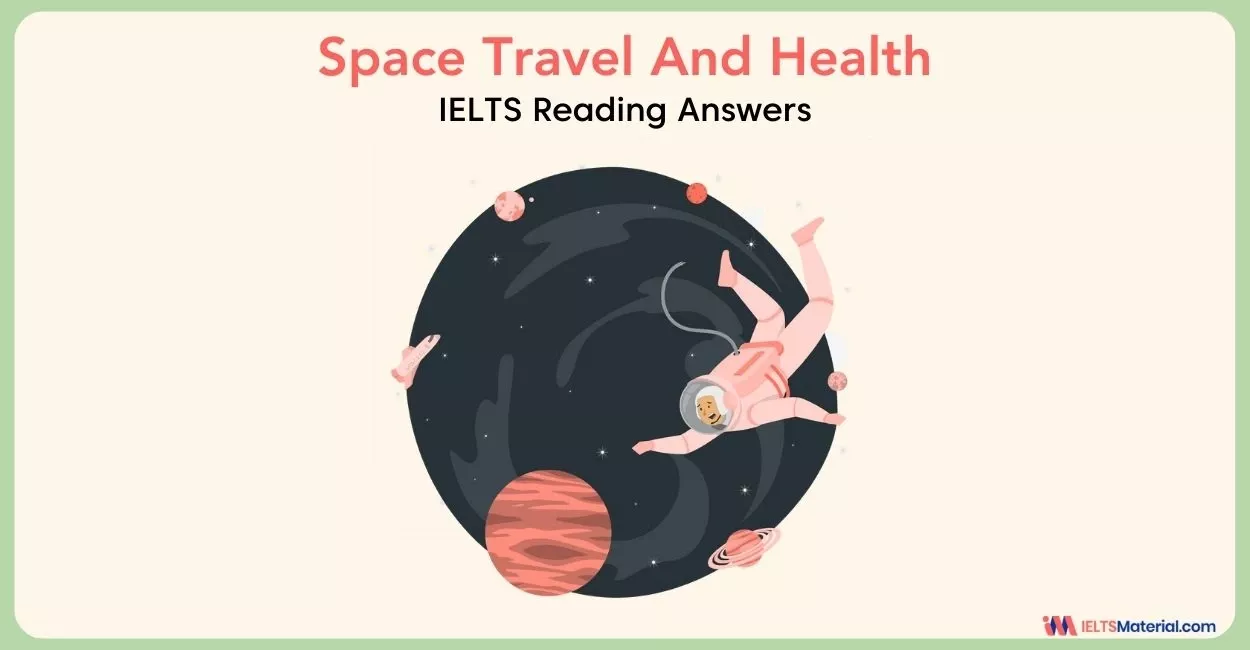
Kasturika Samanta
Recent Articles

Nehasri Ravishenbagam

Haniya Yashfeen

Haniya Yashfeen

Haniya Yashfeen




Post your Comments